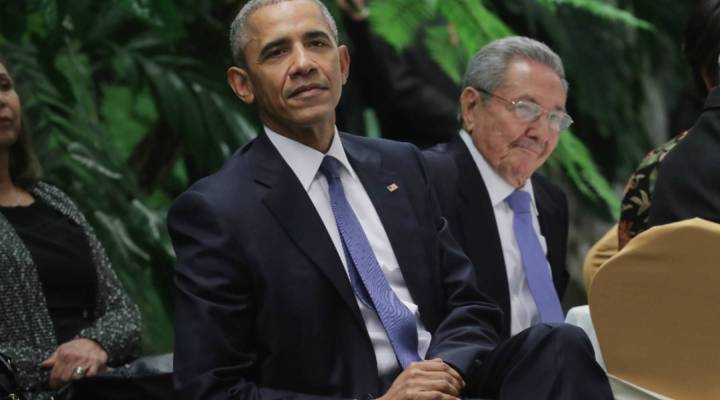
Obama speech is eagerly awaited in Cuba

President Obama continues his historic visit to Cuba with a speech directed at the Cuban people Tuesday morning at El Gran Teatro de Havana.
The initiatives the White House has undertaken in the last 15 months to normalize ties with Cuba, loosen travel restrictions, and allow the country to use the U.S. dollar for international transactions, among other changes, are already having a significant financial impact on the island. The changes will amount to $800 million in potential savings and new revenues for Cuba by the end of 2016, according to new estimates by the U.S.-Cuba Trade and Economic Council.
“It’s a huge number,” said John Kavulich, the organization’s president. “It’s all new money.”
Moving forward — absent Congress fully lifting the embargo, which is not likely any time soon — “the number one goal of the Cuban government, and thus the Cuban people, would be to access U.S. credit markets,” said Kavulich. “Not just from the U.S. private sector, but from the U.S. government.”
However, he noted that even if Cuba were to gain access to programs at the Department of Agriculture or the Export-Import Bank, for example, the country would still struggle to qualify for credit, “because of their chronic shortage of foreign exchange and their chronic inability to pay their commercial and government-to-government bills on time.”
In addition to Congress, the ball also rests in the Cuban government’s court, said Theodore Henken, a professor at Baruch College who is currently in Cuba for President Obama’s visit.
He said Cubans often refer to an “internal embargo that restricts their economic and political and civic freedoms” as the ‘auto-bloqueo.’
The people’s top item for that domestic to-do list: “Internet, internet, internet,” he said. “Affordable, wide-access, unfiltered and uncensored internet.”
There’s a lot happening in the world. Through it all, Marketplace is here for you.
You rely on Marketplace to break down the world’s events and tell you how it affects you in a fact-based, approachable way. We rely on your financial support to keep making that possible.
Your donation today powers the independent journalism that you rely on. For just $5/month, you can help sustain Marketplace so we can keep reporting on the things that matter to you.












